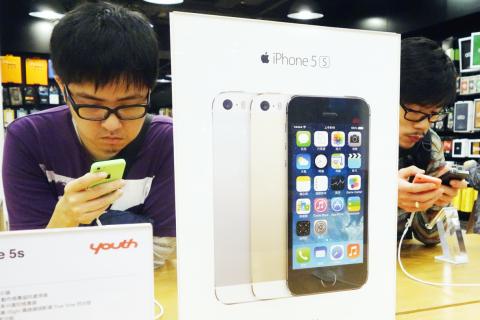The Fair Trade Commission (FTC) yesterday fined Apple Asia Ltd NT$20 million (US$666,220) for restricting local telecommunications companies to set their sale prices of iPhones — a move that inhibits competition.
“The commission’s ruling makes Taiwan the first country to fine Apple Inc’s subsidiaries concerning their handset distributors’ pricing, while there is a similar ongoing investigation concerning Apple Inc for impeding competition in Europe,” Fair Trade Commission Vice Chairman Sun Lih-chyun (孫立群) said.
Apple Asia Inc has to stop the practice immediately once the company receives official documentation from the government, otherwise the company may be subject to another fine of NT$100,000 up to NT$50 million, Sun said.

Photo: Lo Pei-der, Taipei Times
“If Apple Asia hired local companies to provide services and sell iPhones, the company can set prices for them,” Sun said. “However, based on the contracts between Apple and their handset distributors, the company actually sold its iPhones to local companies, therefore local companies should have the right to set prices themselves.”
According to Sun, Apple Asia violated Article 18 of the Fair Trade Act (公平交易法), which states that when an enterprise supplies goods to its trading counterparts for resale to a third party, the trading counterparts shall “be allowed to decide their resale prices freely.”
The contracts between Apple Asia and Chunghwa Telecom Co (中華電信), Taiwan Mobile Co (台灣大哥大) and Far EasTone Telecommunications Co (遠傳電信) showed that Apple Asia demanded the three companies to send their iPhone pricing plans for its review, Sun said.
In e-mails between high-ranking officials of the companies, the commission also found evidence that Apple Asia required local companies to adjust plans they proposed concerning the prices for iPhones, the subsidies they offer for iPhones with contracts, and the price difference between the iPhone 4S and the iPhone 5, he said.
The contracts between Apple Asia and the three local companies also stipulated that the conditions they set for buying iPhones, such as subsidies these companies offer for buying iPhones with contracts, cannot be lower than those of their competitors, Sun said.
The three local companies also needed to submit their promotion plans for iPhones for the approval and confirmation of Apple Asia, he added.
Sun said the commission investigated three other smartphone makers, HTC Corp (宏達電), Sony Corp and Samsung Electronics Taiwan, but none of them has reached similar contracts with local service providers.
The three companies account for 80 percent of the local market for telecommunication services, Sun said, adding that 90 percent of iPhones sold in Taiwan are from the three companies, with most of the headsets sold with contracts.
Sales of iPhones in Taiwan account for 1 percent of iPhones sold by Apple Inc around the world, Sun said.
The commission established the case in April this year when FTC Chairman Wu Shiow-Ming (吳秀明) was urged by legislators to investigate why all local mobile service providers had set the same prices for iPhones, Sun said.

AGING: As of last month, people aged 65 or older accounted for 20.06 percent of the total population and the number of couples who got married fell by 18,685 from 2024 Taiwan has surpassed South Korea as the country least willing to have children, with an annual crude birthrate of 4.62 per 1,000 people, Ministry of the Interior data showed yesterday. The nation was previously ranked the second-lowest country in terms of total fertility rate, or the average number of children a woman has in her lifetime. However, South Korea’s fertility rate began to recover from 2023, with total fertility rate rising from 0.72 and estimated to reach 0.82 to 0.85 by last year, and the crude birthrate projected at 6.7 per 1,000 people. Japan’s crude birthrate was projected to fall below six,

US President Donald Trump in an interview with the New York Times published on Thursday said that “it’s up to” Chinese President Xi Jinping (習近平) what China does on Taiwan, but that he would be “very unhappy” with a change in the “status quo.” “He [Xi] considers it to be a part of China, and that’s up to him what he’s going to be doing, but I’ve expressed to him that I would be very unhappy if he did that, and I don’t think he’ll do that. I hope he doesn’t do that,” Trump said. Trump made the comments in the context

SELF-DEFENSE: Tokyo has accelerated its spending goal and its defense minister said the nation needs to discuss whether it should develop nuclear-powered submarines China is ramping up objections to what it sees as Japan’s desire to acquire nuclear weapons, despite Tokyo’s longstanding renunciation of such arms, deepening another fissure in the two neighbors’ increasingly tense ties. In what appears to be a concerted effort, China’s foreign and defense ministries issued statements on Thursday condemning alleged remilitarism efforts by Tokyo. The remarks came as two of the country’s top think tanks jointly issued a 29-page report framing actions by “right-wing forces” in Japan as posing a “serious threat” to world peace. While that report did not define “right-wing forces,” the Chinese Ministry of Foreign Affairs was

PREPAREDNESS: Given the difficulty of importing ammunition during wartime, the Ministry of National Defense said it would prioritize ‘coproduction’ partnerships A newly formed unit of the Marine Corps tasked with land-based security operations has recently replaced its aging, domestically produced rifles with more advanced, US-made M4A1 rifles, a source said yesterday. The unnamed source familiar with the matter said the First Security Battalion of the Marine Corps’ Air Defense and Base Guard Group has replaced its older T65K2 rifles, which have been in service since the late 1980s, with the newly received M4A1s. The source did not say exactly when the upgrade took place or how many M4A1s were issued to the battalion. The confirmation came after Chinese-language media reported